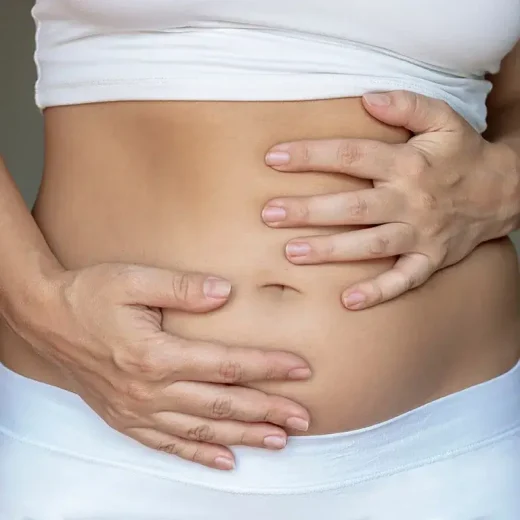Abdominal bloating is a prevalent and often distressing condition that significantly impacts daily life, particularly among women. While some gas production in the stomach and intestines is a normal part of digestion, persistent bloating and abdominal distension may indicate an underlying health issue that requires attention.
What is Bloating?

Bloating occurs when excess gas builds up in the digestive system, creating pressure on the stomach and intestinal walls. A small amount of gas is naturally produced by beneficial gut bacteria and is harmless. However, when gas accumulates and the body struggles to expel it, the resulting tension on the digestive organs can lead to discomfort.
This pressure stimulates nerve endings, causing symptoms such as:
- A sensation of fullness or tightness in the abdomen
- Shortness of breath or palpitations
- Frequent burping or flatulence
- Irregular bowel movements
- Sharp or cramping abdominal pain
What Causes Abdominal Bloating?
Several factors can contribute to excessive gas and bloating, including:
- Digestive System Disorders: Conditions like celiac disease, irritable bowel syndrome (IBS), ulcers, gastritis, and gallbladder issues disrupt normal digestion, leading to gas buildup.
- Fluid Retention (Edema): High sodium intake, inactivity, or low potassium levels can cause fluid retention, contributing to a bloated appearance.
- Poor Eating Habits: Rapid eating, overconsumption of carbohydrates, and low-fiber diets can slow digestion and increase swallowed air, worsening bloating.
- Food Intolerances: Sensitivity to lactose, gluten, or certain foods (e.g., beans, cruciferous vegetables) can trigger bloating in susceptible individuals.
- Stress: Anxiety and stress disrupt digestive function, potentially leading to bloating and other gastrointestinal issues.
What Causes Persistent Abdominal Swelling?
Chronic bloating may stem from:
- Digestive disorders like lactose intolerance or IBS
- Structural issues such as intestinal blockages or tumors
- Fluid retention due to medical conditions like liver disease
- Hormonal fluctuations, particularly in women
Persistent swelling warrants medical evaluation to rule out serious conditions.
How to Treat Abdominal Bloating?
To alleviate bloating, consider these strategies:
- Dietary Adjustments: Avoid gas-producing foods, eat slowly, and increase fiber intake gradually.
- Hydration: Drink plenty of water to aid digestion and reduce fluid retention.
- Exercise: Regular physical activity, such as walking, helps stimulate digestion.
- Stress Management: Techniques like yoga or meditation can improve gut health.
If bloating persists or is severe, consult a healthcare provider.
What Causes Lower Abdominal Bloating?
Lower abdominal bloating may result from:
- Gynecological issues (e.g., ovarian cysts, endometriosis)
- Urinary tract infections or kidney stones
- Digestive problems like constipation or IBS
A thorough medical assessment is essential for accurate diagnosis.
What is Good for Lower Abdominal Bloating?
Treatment depends on the cause:
- Antibiotics for infections
- Dietary changes for constipation
- Surgical intervention for structural issues like cysts or stones
Always seek professional guidance for persistent symptoms.
Which Doctor Should You See for Abdominal Swelling?
Start with a primary care physician or internist. They may refer you to a:
- Gastroenterologist for digestive issues
- Gynecologist for pelvic-related bloating in women
- Urologist for urinary tract problems
What Causes Upper Abdominal Bloating?
Upper bloating often links to:
- Acid reflux or gastritis
- Gallbladder or liver disease
- Pancreatic disorders
Medical evaluation is crucial to identify the root cause.
What Causes Abdominal Swelling in Women?
Women may experience bloating due to:
- Hormonal changes (e.g., PMS, pregnancy)
- Gynecological conditions (e.g., fibroids, PID)
- Digestive sensitivities
A gynecologist or gastroenterologist can provide targeted care.
What is Good for Abdominal Bloating?
To reduce bloating:
- Eat mindfully, chewing thoroughly and avoiding talking while eating.
- Limit carbonated drinks and gas-producing foods.
- Manage stress through relaxation techniques.
For stomach pain linked to bloating, addressing stress and dietary triggers is key.
Treatment of Bloating
Treatment varies by cause and may include:
- Diagnostic Tests: Endoscopy or colonoscopy to identify issues.
- Medications: Antacids, probiotics, or prescription drugs as needed.
- Lifestyle Changes: Small, frequent meals, increased water intake, and regular exercise (e.g., yoga, swimming).
A tailored approach ensures effective relief and long-term digestive health.